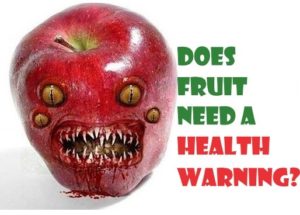
They say that having sugar’s bad for you. And fruit contains huge amounts of sugar (fructose). So, if you’re daily diet including lots of fruit, aren’t you inadvertently paving the way towards liver toxicity and a whole range of chronic diseases 1 ?
Blog Contents
Sugar toxicity
Toxicity is reached when you eat around 50 grams of sugar 2 . A small can of coca cola contains around 39 grams 3 . The majority of processed foods contain added sugar, and most people eat some form of sweet food or dessert during the day – whether it’s ice cream, confectionery, chocolate, cakes, biscuits or yogurt. This means that most people eating the typical modern western diet are likely to be reaching sugar toxicity levels almost every day. So it’s no surprise to see the terrifying rise in diet-related diseases 4 5 , in which sugar consumption is thought to play a significant part.
WFPB diet and fructose
On a WFPB diet, you’re supposed to feel as pure as the driven snow and regularly pat yourself on the back for avoiding all or the vast majority of that nasty added sugar; but are we simply jumping from the frying pan into the fire by eating as much fruit as we do? For instance, I personally eat as many as 7-10 servings of fruit and berries in a day. Should I worry about this? After all, just one large apple can contain around 29 grams of sugar 6 .
It ain’t what you do, it’s the way that you do it
It appears 2 that the problem lies in how the sugar is consumed.

According to Dr. Bruce Bistrian, a professor at the Harvard Medical School 7 : “The nutritional problems of fructose—and of table sugar, which is another form of sugar called sucrose—come when they are added to foods, whether in the form of sucrose, high-fructose corn syrup, molasses, cane sugar, corn sweetener, raw sugar, syrup, honey, or fruit juice concentrates…The higher intake of these forms of added sugar that is associated with an increased risk for obesity, type 2 diabetes, and cardiovascular disease.”
But – and this is the important bit – he adds that: “Fruits are not harmful and are even beneficial in almost any amount…Fruits contain lots of fiber…which slows its absorption, [and] many other essential nutrients, such as flavonoids.”
Almost any amount of fruit is okay?
What does ‘almost’ mean here? 5 servings? 10? 20? In order to answer this, there would have to be some clinical research data that looks at the effects of a daily intake of very high levels of fruit. And it just so happens that such data has existed for decades.
The evidence
A March 1971 study 8 had participants eat twenty servings of fruit per day. That’s in excess of 200 grams of fructose.
Study results
Rather than find any adverse effects, the researchers found improvements in terms of body weight, blood pressure, insulin and blood lipid levels after three to six months.
An April 2001 study 9 pretty much duplicated these earlier findings. It, too, had study participants eat around 20 servings of fruit for a few weeks and, once again, not only were there zero adverse effects, but there were significant benefits in terms of weight, blood pressure and triglycerides. Indeed, there was an average 38-point drop in LDL cholesterol – something which modern medicine would struggle to duplicate with all of its side-effect-laden pharmaceutical potions.
Final thoughts
So, I’m not going to worry about my 7-10 servings of fruit and berries a day. In fact, I’m going to pat myself on the back and tuck into a bowl of fruity muesli goodness right now.
One last comment. We have a family friend who is obese and has diabetes, high cholesterol and advanced cardiovascular disease. I have tried on several occasions to suggest that he considers trying a WFPB diet to reduce his atrocious symptoms. However, each time I point him in the direction of nutritional research, he mentions that the ‘diabetes nutritionist’ recommended by his GP has warned him against eating more than three strawberries and half a small banana in a day. However, they have recommended that he has a serving of prawns on a daily basis – a particularly high cholesterol food…

References
- Sugar: Nutritionfacts article [↩]
- R H Lustig. Fructose: it’s “alcohol without the buzz”. Adv Nutr. 2013 Mar 1;4(2):226-35. [↩] [↩]
- United States Department of Agriculture. Agricultural Research Service. USDA Food Composition Databases [↩]
- England’s Obesity Hotspots [↩]
- NHS Cuts Out Sugar [↩]
- United States Department of Agriculture. Agricultural Research Service. USDA Food Composition Databases. [↩]
- Harvard Health Letter: Rethinking fructose in your diet. Published: July, 2013. [↩]
- B J Meyer, E J de Bruin, D G Du Plessis, M van der Merwe, A C Meyer. Some biochemical effects of a mainly fruit diet in man. S Afr Med J. 1971 Mar 6;45(10):253-61. [↩]
- D J Jenkins, C W Kendall, D G Popovich, E Vidgen, C C Mehling, V Vuksan, T P Ransom, A V Rao, R Rosenberg-Zand, N Tariq, P Corey, P J Jones, M Raeini, J A Story, E J Furumoto, D R Illingworth, A S Pappu, P W Connelly. Effect of a very-high-fiber vegetable, fruit, and nut diet on serum lipids and colonic function. Metabolism. 2001 Apr;50(4):494-503. [↩]